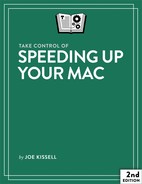Read Me First
Welcome to Take Control of Speeding Up Your Mac, Second Edition, version 2.1, published in January 2019 by alt concepts inc. This book was written by Joe Kissell and edited by Caroline Rose.
Don’t settle for a sluggish Mac! If it seems your Mac has become slower and less responsive over time, it’s not your imagination—but it’s also a problem you can solve without buying a new computer. This comprehensive book teaches you how to find the exact causes of slow performance and take steps to make your Mac snappy again.
If you want to share this ebook with a friend, we ask that you do so as you would with a physical book: “lend” it for a quick look, but ask your friend to buy a copy for careful reading or reference. Discounted classroom and Mac user group copies are available.
Copyright © 2019, alt concepts inc. All rights reserved.
Updates and More
You can access extras related to this ebook on the web (use the link in Ebook Extras, near the end; it’s available only to purchasers). On the ebook’s Take Control Extras page, you can:
Download any available new version of the ebook for free, or buy any subsequent edition at a discount.
Download various formats, including PDF, EPUB, and Mobipocket. (Learn about reading on mobile devices on our Device Advice page.)
Read the ebook’s blog. You may find new tips or information, as well as a link to an author interview.
If you bought this ebook from the Take Control website, it has been added to your account, where you can download it in other formats and access any future updates. However, if you bought this ebook elsewhere, you can add it to your account manually; see Ebook Extras.
Basics
To review background information that might help you understand this book better, such as finding System Preferences and working with files in the Finder, I recommend reading Tonya Engst’s ebook Take Control of Mac Basics.
In this book, when I use the term disk by itself, I generally mean your Mac’s primary internal storage device—whether that’s a mechanical hard drive, an SSD, or other solid-state storage. (Apple, after all, still uses the term “Macintosh HD” as the default name for your Mac’s startup volume, even when it’s not stored on a hard disk.) A drive is a physical device for storing data; a single drive can comprise one or more volumes, or logical storage devices. The volume that contains the copy of macOS currently used to boot your Mac is your startup volume. I’ll specify hard drive when I need to talk specifically about the little boxes with spinning platters.
What’s New in Version 2.1
Version 2.1 is a minor revision that brings this book up to date with macOS 10.14 Mojave and various changes in third-party hardware and software. Nearly all the changes in this version were quite small, but some of the noteworthy items I addressed were:
Removed outdated information about obsolete hardware and discontinued software
Added a sidebar about the perils of APFS with mechanical hard drives; see Hard Disks and Macs Running Mojave
Noted current limitations in APFS support in Use a Third-Party Disk Repair Tool and Use a Defragmenting Utility
Added links to ad-blocking extensions suitable for Safari 12 in Block Ads and Trackers
Added a note about new Wi-Fi naming conventions in 802.11 Flavors
Updated my recommendations for fast DNS service in Use a Faster DNS Provider
Included information about the RAM and storage upgradability of newer Mac models in Upgrade Your Hardware
What Was New in the Second Edition
The second edition of this book (version 2.0) represented not only a change in its version number but also in its title. This book’s most recent ancestor in the Take Control series was Take Control of Speeding Up Your Mac, which was published in May 2011 and last updated in September 2012. I subsequently acquired publication rights to the book, updated it significantly, and rereleased it with a new title (Speeding Up Your Mac: A Joe On Tech Guide) in June 2016, followed by a version 1.1 update in September 2016.
After I purchased Take Control Books from TidBITS Publishing Inc. in May 2017, I decided to bring this book back under the Take Control umbrella. That meant reverting to its previous title and incrementing the edition number by one (even though there was, in effect, another edition of the book between the first and second).
Along with a large number of minor changes, here are the major changes between Speeding Up Your Mac: A Joe On Tech Guide version 1.1 and Take Control of Speeding Up Your Mac, Second Edition:
Updated the book for compatibility with macOS 10.13 High Sierra and the latest Mac models available as of December 2017
Added iStat Menus to the list of utilities in Use Live Monitoring Tools
Mentioned a way to speed up Time Machine in Adjust Backup Software Settings
Clarified details about how much space you should leave available on your disk in Determine How Much Space You Need
Revised Use Optimized Storage in Sierra or Later with better details and new advice
Updated various topics in Speed Up Your Browser to cover the latest browser versions
Revised Monitor Network Activity to use Little Snitch, rather than the now-discontinued Private Eye, as an example
Added a mention of mesh/hub-and-spoke Wi-Fi routers in Signal Strength
Explained the importance of using the right kind of Ethernet cable in Check Your Wired Ethernet Connection
Revised Use a Faster DNS Provider to reflect the fact that namebench is no longer being developed (and has problems under High Sierra and later)
Added CursorSense to the utilities covered in Adjust Acceleration
Updated the sidebar Is My Storage Upgradable? and the topic Add a Second (or Larger) Display to cover recent Mac models
Rewrote most of the chapter Speed Up Your Peripherals, which now contains complete information about USB 3.1 and Thunderbolt 3
